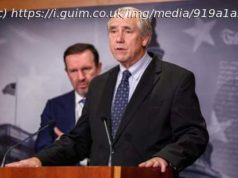The Alabama election debacle could wake up the GOP leadership to their biggest problems in time for 2018, says Jake Novak.
If the Republicans painstakingly examine their epic series of mistakes, their stunning loss in the Alabama U. S. Senate race could turn out to be a blessing in disguise.
As it is now, the GOP should be scared stiff after losing a supposedly rock solid Senate seat. But that one seat may be a relatively small price to pay if the GOP learns one very important lesson that could save it in the 2018 midterm elections and beyond.
The lesson they need to learn is that in politics, it’s all about the big picture. No one member of any party can get what he or she wants unless that party wins elections first. It’s as simple as that.
I’ve written numerous times about how both the Republican and Democratic parties have lost their national relevance and clout. But Roy Moore’s nomination and his loss in the general election in Alabama show that the GOP’s short-sightedness is regionally lethal too.
That short-sightedness comes from many of the party’s powerbrokers, each of whom needs to be addressed for the Republicans to recover.
The first source is obvious. Former White House adviser Steve Bannon is clearly not concerned about the Republicans’ big picture prospects in Washington and he showed it in Alabama by backing a fatally flawed candidate.
As a political bomb thrower, Bannon isn’t looking to help either party; he just wants to strike at the establishment. In backing Moore, he was poking a stick in the eye of Mitch McConnell. But losing the Republican congressional majority is certainly not a winning formula for advancing his populist agenda.
Bannon is still not the biggest reason for the Alabama debacle.
That’s where McConnell, and his own brand of extreme selfishness, comes in. McConnell and company need to make a priority of grooming candidates that are conservative enough to win GOP primaries in red states – where the most partisan voters hold sway. But then they need to make sure they’re not too extreme for the general electorate.
McConnell really blew it in Alabama. Moore’s strong polling numbers early on should have spooked him into backing a strong candidate. But he backed Strange, who was a weak choice from the start, simply because Strange promised to support him as majority leader.
In throwing his weight behind Strange, McConnell snubbed the much more viable Rep. Mo Brooks with whom he had clashed. McConnell’s actions weren’t strong enough to get Strange a victory, but they did sink Brooks. That handed the primary victory to Moore, and we know what happened next.
A few months ago, the 2018 electoral map in the Senate looked like a slam dunk for the GOP. Only eight of the 34 total Senate seats up for grabs next year are currently held by Republicans, meaning the Democrats have a lot more turf to defend. But since the fall, GOP senators Bob Corker and Jeff Flake have decided not to run for re-election.
Plus, Bannon has continued his threats to challenge many Republican incumbents in primaries. The stakes are now much higher for the GOP to recruit better candidates and in more states than they thought they needed to just a few months ago. In the House, the situation is even more challenging. About twice as many Republican House members as Democrats are retiring ahead of the 2018 midterms.
Even President Trump immediately showed he got the picture in a post-Alabama election tweet Wednesday:
Surely the GOP leadership now sees that getting those “great Republican candidates” President Trump is referring to can’t be left to chance. All of this means the party needs to spend a lot of time and money finding viable replacements.
Vetting potential candidates with the most vigorous background checks would be a great place to start to avoid the kind of issues that came out of Moore’s past. Setting up more public speaking opportunities for the candidates is another smart way of road testing the field.
None of that will happen as long as McConnell puts his position as Senate Majority Leader above the GOP congressional majority. When he does that, he increases the chances of losing both. That’s what it means to lose sight of the big picture.
That’s also why Alabama is such a potentially big gift for the Republicans. There isn’t a redder state on the map, but that election proved that losing sight of the national big picture can be fatal anywhere. Those who are pushing for everyone from McConnell to rank-and-file GOP primary voters to focus on the big picture couldn’t have asked for a better Christmas present.
Commentary by Jake Novak, CNBC.com senior columnist. Follow him on Twitter @jakejakeny.
For more insight from CNBC contributors, follow @CNBCopinion on Twitter.






